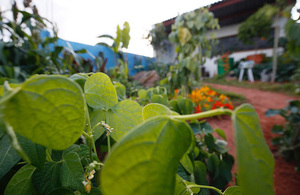New UK aid funding for smart crops on display in Chelsea Flower Show
International Development Secretary announces new UK aid investment in vital research on bio-fortification to help tackle malnutrition and end global hunger.

Biofortified crops, developed by scientific research supported by UK aid, on display in the gold medal-winning CAMFED garden at the 2019 Chelsea Flower Show. Picture: DFID/Russell Watkins
UK aid is investing in new research to develop nutrient-rich, climate-resilient super crops to improve the diets of people in the world’s poorest countries, International Development Secretary Rory Stewart announced today (Wednesday 22 May)
The Department for International Development (DFID) is to give fresh funding to help create the crops, which will improve the health and nutrition of women, adolescent girls and children under five in almost 14 million households in the developing world by 2022.
The UK aid funded crops are also bred to be more resilient to climate change. They are on display this week at the Chelsea Flower Show in a garden developed by female education charity, CAMFED. It is the first garden in the show’s history to feature such super crops.
International Development Secretary Rory Stewart said:
I’m proud that DFID is not only part of the first ever RHS Chelsea Flower Show garden to showcase climate-smart crops, but that we are also working with CAMFED to train female entrepreneurs in sustainable farming methods to support their communities in Zimbabwe.
It is often the poorest people who are the most affected by increasingly erratic weather and rising temperatures, which is why UK aid is supporting the development of the latest technology and science to help crops withstand drought and floods.
I hope the thousands of visitors to the show enjoy the garden and are inspired to take their own steps to help tackle climate change and protect our environment for future generations around the world.
Many varieties of these nutrient-rich crops can provide up to 80% of the daily vitamins required for women and children. These biofortified crops are also bred to have higher yields.
UK aid has already played a major role in the development of biofortified crops, which are now grown and harvested across 30 countries in Sub-Saharan Africa and South-Asia. They include maize, cassava and sweet potato, all rich in vitamin A, beans and millet, rich in iron, and wheat and rice, rich in zinc.
DFID’s chief scientist Charlotte Watts said:
CAMFED’s garden captures so well the opportunities that science and innovation provide for modern development in Africa.
By harnessing climate and nutrition-smart technologies like biofortified crops, we can improve the livelihoods of thousands of women and girls. These crops are not just more resilient to droughts and diseases but provide a sustainable source of much needed nutrients to rural communities.
These, in combination with the transformative impact of education, are empowering women to run agricultural businesses and lift themselves and their households out of poverty.
Notes to editors
- DFID has announced today that it is investing a further £33 million in research on biofortification through its international research partnership with the CGIAR’s HarvestPlus and the International Potato Center.
- Biofortification is a proven technology which reduces nutritional deficiencies in crops. It helps minimise the gap between micronutrient requirements and actual intake by increasing levels of vitamin A, iron, and zinc— three of the micronutrients identified by the World Health Organization as most lacking in diets globally.
- The CAMFED Garden at RHS Chelsea “Giving Girls a Space to Grow”, aims to raise awareness of the role young women play in food production in Africa, and their leadership in tackling climate change. The garden features biofortified crops, alongside a range of crops that are typically grown in Zimbabwe. Also, on show are solar pumps and solar lights. The crops and solar technology have all been developed with support from UK aid through DFID’s Research and Evidence Division. After the show the garden will be moved to the Eden Project in Cornwall.
- HarvestPlus and the International Potato Center are developing more nutritious varieties of staple food crops, which contain higher amounts of vitamin A, iron or zinc. Regular consumption of these super crops improves people’s diets and health.
- HarvestPlus and the International Potato Center are both part of the international agricultural research system known as the CGIAR. The CGIAR is a network of 15 independent agriculture research centres operating in around 100 countries globally.
- The World Health Organisation estimates that around two billion people worldwide suffer from hidden hunger or a lack of key vitamins and minerals like iron and vitamin A.
General media queries (24 hours)
Email [email protected]
Telephone 020 7023 0600
If you have an urgent media query, please email the DFID Media Team on [email protected] in the first instance and we will respond as soon as possible.